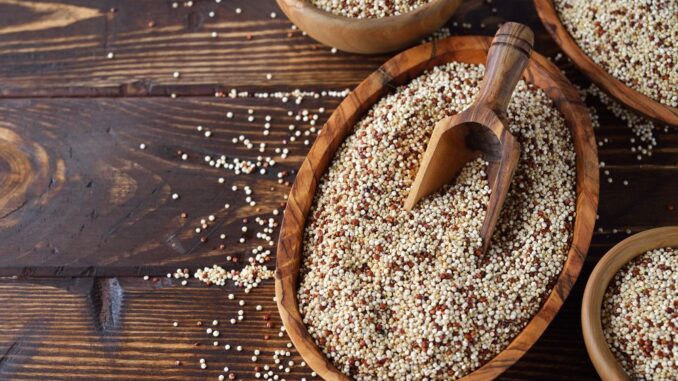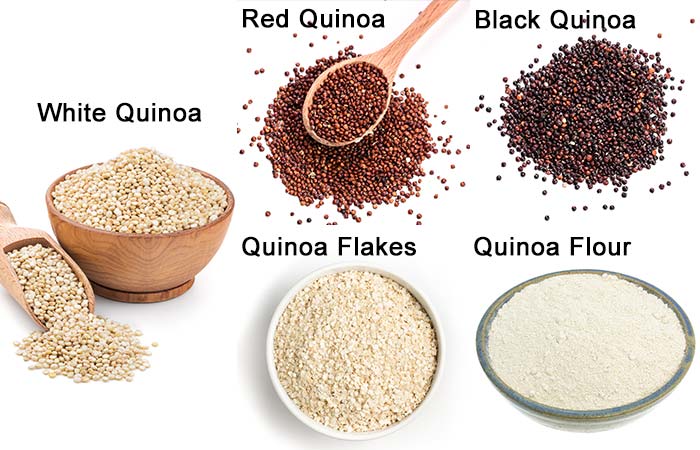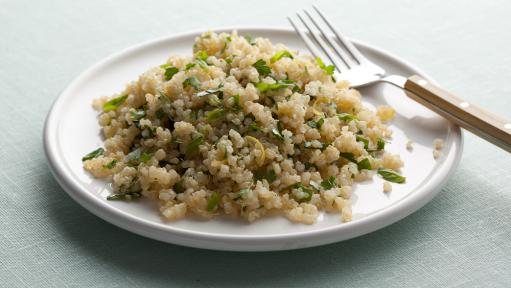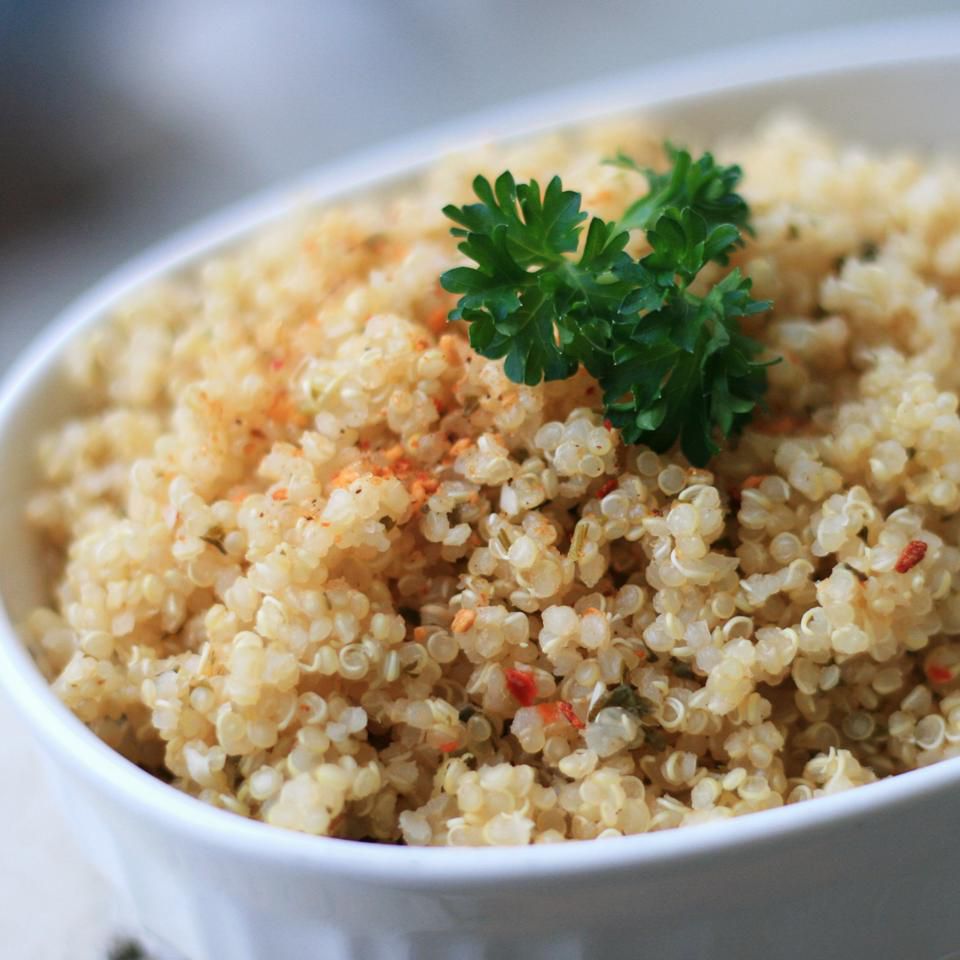
Quinoa is a rising star in the world of healthy eating. And it’s not hard to see why. This little seed has an exceptional nutritional profile. It is gluten-free and high in protein.
It is also incredibly versatile in the kitchen. Originally cultivated in the Andes region of South America, quinoa has found its way into a wide range of dishes and dietary preferences, from vegan and high protein to keto diets.
Now, let’s get straight to the point, and examine quinoa nutritional facts, the evidence-based health benefits of quinoa, as well as, some practical cooking tips for incorporating this supergrain in your diet.
What is Quinoa?

Quinoa seeds come in various colors, including white, red, and black.
Quinoa is often used as a low-carb substitute for rice or other grains. It is used as a flour substitute in gluten-free baking. But the interesting fact is that – Quinoa is not a grain at all! It is classified as a pseudocereal.
True grains, such as rice or wheat, come from the grass family while quinoa seeds are the edible part of a flowering plant belonging to the amaranth family (1)
Evidence-Based Health Benefits of Quinoa
This tiny seed packs a powerful punch when it comes to health benefits. From promoting heart health and aiding in weight management, here are 12 impressive reasons to include quinoa in your diet:
1. Rich and Complete Source of Plant-Based Protein
Quinoa has an exceptional protein content. It is a complete protein, meaning it contains all nine essential amino acids in significant amounts.
Amino acids are the building blocks of proteins. Quinoa contains higher quantities of essential amino acids compared to many other grains and legumes.
Plant-based proteins tend to lack certain essential amino acids, especially lysine. Quinoa has adequate amounts of lysine, making it one of the most popular sources of vegan protein.
2. It’s Gluten-Free

While wheat, barley, and rye grains contain gluten, quinoa is naturally gluten-free. This makes quinoa a safe option for those with celiac disease or gluten sensitivity (x).
Quinoa flour is popularly used in baking gluten-free cookies and cakes.
3. Offers Digestive Benefits
Quinoa is your digestive system’s best friend. Packed with fiber, it keeps your bowels moving smoothly, promoting a happy tummy.
You get double the fiber from just one cup of quinoa when compared to other grains. Did you know that eating quinoa keeps you feeling satiated for longer than eating the same amount of rice or wheat (x)?
Quinoa contains both soluble and insoluble fibers. Regularly including high-fiber foods in your diet helps treat constipation. It improves blood sugar regulation and lowers your cholesterol levels.
4. Improves Blood Sugar Control
Quinoa is a smart choice for those who are concerned about their blood sugar control and overall health.
Quinoa has a low glycemic index (GI). The glycemic index is a scale that measures how quickly carbohydrates in a food raise blood sugar levels after consumption. Foods with a low GI are digested and absorbed more slowly, leading to a gradual increase in blood sugar levels.
Quinoa’s low GI makes it a favorable option for individuals looking to manage their blood sugar levels, including those with diabetes or those seeking to maintain steady energy throughout the day.
5. It’s Your Daily Multivitamin
Quinoa is highly regarded for its rich array of vitamins, minerals, and other important nutrients. Think of it as your daily multivitamin, but way tastier.
Quinoa provides a significant amount of nutrients such as magnesium, manganese, phosphorus, copper, and several B vitamins while offering relatively few calories.
6. Rich in Antioxidants
Quinoa contains a variety of antioxidants that contribute to its health benefits (x).
Quinoa is rich in flavonoids, which are a group of polyphenolic compounds with antioxidant properties. These compounds help protect cells from oxidative damage and reduce the risk of chronic diseases.
Phytonutrients, such as saponins and quercetin, found in quinoa, have antioxidant and anti-inflammatory properties. Quinoa also contains tannins, which are a type of polyphenol with antioxidant effects.
7. Boosts your Iron Intake
Iron is an essential mineral that plays a crucial role in various bodily functions, including oxygen transport in the blood, energy production, and overall health.
Quinoa provides a substantial amount of non-heme iron, which is the type of iron found in plant-based foods. While non-heme iron is not as easily absorbed by the body as the heme iron found in animal products, consuming quinoa along with vitamin C-rich foods can enhance iron absorption.
This makes quinoa a beneficial addition to vegetarian and vegan diets, as well as for individuals seeking to meet their iron requirements without relying on animal sources.
8. Supports Heart Health
Quinoa is an excellent source of magnesium, a mineral that supports healthy blood pressure regulation. Adequate magnesium intake can help lower blood pressure, reducing the risk of hypertension and heart-related issues.
Quinoa’s rich fiber content helps remove excess cholesterol from the body, preventing it from clogging arteries and reducing the risk of heart disease.
9. Keeps your Bones Strong and Healthy
Quinoa is a good source of essential minerals, such as calcium and magnesium, which are critical for maintaining strong and healthy bones.
Quinoa’s magnesium content plays a vital role in bone density and strength. Adequate magnesium intake helps to prevent bone disorders and osteoporosis.
Phosphorus, found in quinoa, is another essential mineral for bone health. It works in tandem with calcium to form the mineral matrix of bones and teeth.
10. Boosts your Brain Functions
Quinoa is rich in B vitamins, including folate, riboflavin, and vitamin B6, which are essential for brain function.
These vitamins support cognitive health and are involved in processes like memory, mood regulation, and neurotransmitter production. They give your brain a boost, helping you stay sharp and focused.
11. A Valuable Ally in Weight Management
Quinoa can be a valuable ally in weight management for several reasons. It is rich in both protein and dietary fiber. These promote a feeling of fullness, keep you feeling satisfied for longer periods, and help regulate your appetite.
Its low glycemic index helps maintain steady blood sugar control, preventing rapid spikes and crashes. This can help prevent sudden hunger pangs and cravings for sugary or high-calorie foods.
Quinoa’s nutrient density ensures you get essential vitamins and minerals in a relatively low-calorie package supporting overall nutrition and promoting weight loss.
Quinoa Nutrition Facts

Quinoa has a distinctive nutrient profile compared to traditional grains.
Check out the nutrition facts for 100 grams of cooked quinoa (2):
- Energy or Calories: 120 kcal
- Protein: 4.4 grams
- Fat:1.92 grams
- Carbs: 21.3 grams
- Fiber: 2.8 grams
Quinoa is particularly rich in minerals like magnesium and manganese. Here’s a quick look at the minerals in 100 grams of cooked quinoa:
- Calcium – 17 mg
- Iron – 1.49 mg
- Magnesium – 64 mg
- Phosphorus – 152 mg
- Potassium – 172 mg
- Sodium – 7 mg
- Zinc – 1.09 mg
- Copper – 0.192 mg
- Manganese – 0.631 mg
- Selenium – 2.8 µg
This is close to a 30% percentage of the daily nutrient requirements for magnesium and manganese in adults, and about 40% for phosphorous and copper. Just 100 grams of cooked quinoa offers meets about 35% daily iron requirement for men and 15% for females. For your zinc needs, you get around 18% for males and 25% for females.
Now let’s take a look at the vitamins in 100 grams of cooked quinoa:
- Thiamin 0.107 mg
- Riboflavin 0.11 mg
- Niacin 0.412 mg
- Vitamin B-6 0.123 mg
- Folate, total 42 µg
- Choline, total 23 mg
- Carotene, beta 3 µg
- Vitamin E (alpha-tocopherol) 0.63 mg
For a detailed article on quinoa nutrition facts, check out: Quinoa Nutrition Facts: All You Need to Know About This Superfood
For quinoa cooking tips, go to – How to Cook Quinoa Perfectly, Soft and Fluffy
